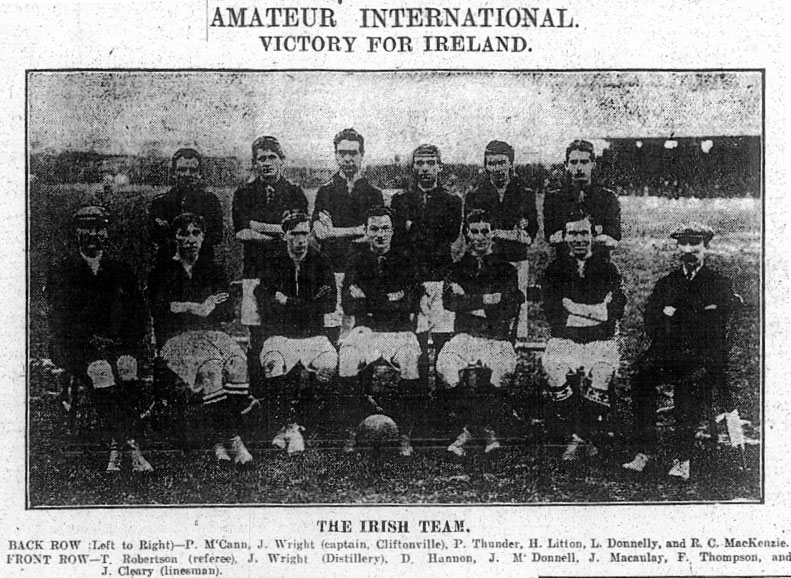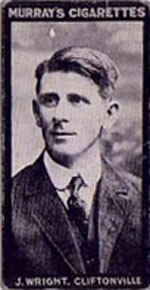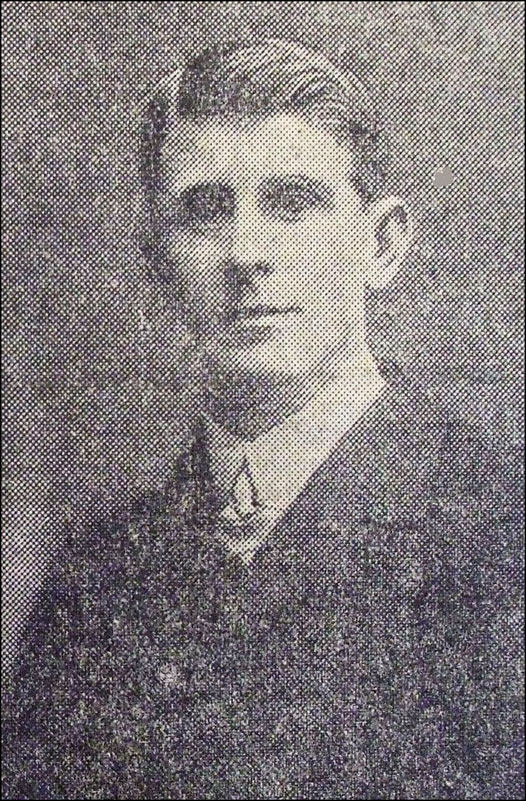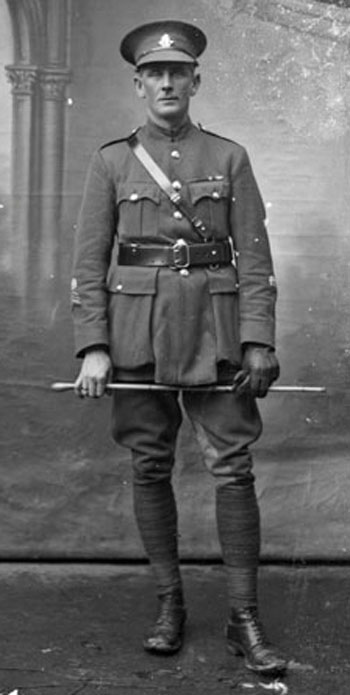Warrant Officer John Wright, MM
John (Jack) Wright was born at Cloughfern, Belfast, County Antrim, on 11 May 1878, first of two children of bleacher Joseph Wright and his wife Rebecca (nee McFall).
It appears that his family later moved to Toronto, Canada, although Jack remained in Ireland.
In the 1890s Wright enlisted in the 2nd Battalion, Royal Irish Rifles (No.5356). He served with the regiment in the Boer War, and in December 1899 was made prisoner at the Battle of Stromberg. After his release by the Boers Wright saw further service in the war. He was mentioned in Earl Roberts' despatch of 4 September 1901, and later that month was awarded a Distinguished Conduct Medal.
He elected to be discharged at the expiration of his seven years service.
Before the First World War Wright was a prominent local footballer. According to the site Northern Ireland's Football Greats:
John Wright was a member of the Cliftonville squad that won the 1907 Irish Cup Final with victory over Shelbourne, though he missed the replay in which the trophy was claimed. He made amends two seasons later as he played in both games as Bohemians were seen-off in the Blue Riband final. Wright also claimed two Championship medals with Cliftonville. In 1906 the title was shared with Distillery after two play-offs could not yield a winner. In 1910, a season in which he ended up on the losing side in the Irish Cup Final for the only time, Wright was part of the Cliftonville side that pipped Belfast Celtic to the title by a two-point margin. The following season he played twice at right-half for Huddersfield before returning to Solitude. Capped six times by Ireland through 1906 and 1907, Wright also twice captained his country. Similarly he twice captained Ireland in amateur internationals against England, both 3-2 wins at Solitude. Between 1905 and 1912 he also played seven times for the Irish league, including in a memorable 0-0 draw with the Football League at the Oval in October 1912.


Wright enlisted in the North Irish Horse at Belfast on 17 August 1914 (No.1008 – later Corps of Hussars No.71197), understating his age by four years. He gave his occupation as electrician, and address as 26 Elmgrove Street, Cliftonville. Three days later he embarked for France with C Squadron, seeing action in the following weeks in the retreat from Mons and advance to the Aisne, and from October south of Ypres.
He was one of three North Irish Horsemen mentioned in Field Marshal French's despatch of 14 January 1915 for "gallant and distinguished service in the field". A later report in the Belfast News-Letter stated that the award was for "his services during the fighting on the Ypres-Armentieres line."
Over the next year Wright won rapid promotion - lance corporal on 2 September 1914, acting corporal on 4 October, lance sergeant on 16 December, sergeant on 6 May 1915 and squadron sergeant-major on 18 October.
As a well-known figure, Wright featured in the letters written home by those met him, some of which were published in the local press. Fellow Horseman Tom Savage wrote from Le Havre:
I have got two very nice chums, Jack Wright, the footballer, who has seen service before, and Billy Caughey, both of Belfast.
(Larne Times and Weekly Telegraph, 19 September 1914)
Sergeant Hanna of the Royal Field Artillery wrote:
It is wonderful the number of people you meet that you never expected to see again. I've met at least twenty chaps who were in my old brigade in India. The other day a squadron of the North Irish Horse bivouacked just beside a spot where we watered our horses, and I met and had a chat with Jack Wright, of Cliftonville, and Sergeant-Major Blakely.
(Belfast News-Letter, 6 November 1914)
On 24 July 1915 the Ballymena Weekly Telegraph reported that:
Trooper William Caughey, who has been serving in France with the North Irish Horse since August last, has just paid a flying visit to his parents at 2 Fortwilliam View Terrace, Skegoneil Avenue, having been allowed four days' leave. It will be of special interest to footballers to read that Trooper Caughey, who was a member of Linfield F.C., is serving under Sergeant Jack Wright, the Cliftonville half.
At the beginning of 1916 Wright was home on leave. The Northern Whig reported that:
Sergeant-Major Jack Wright, of the North Irish Horse, and Quartermaster-Sergeant Victor Morgan, Royal Engineers, were interested spectators of the match at Cliftonville on Saturday. Both were formerly members of he Cliftonville team, and both are home for short leave from service at the front.
In 1917 Wright applied for a commission and at the end of September returned to Ireland for training, reporting for duty at No.7 Officer Cadet Battalion, Fermoy. However it appears that his candidacy was unsuccessful, for on 29 March 1918 he rejoined the North Irish Horse at its Antrim reserve depot. He returned to France on 11 May, joining the North Irish Horse (Cyclist) Regiment at Naours as squadron sergeant-major, warrant officer class 2.
A week before leaving for France he had married Margaret Stevenson at Belmont, Holywood, County Down.
On 25 August Wright was promoted to temporary regimental sergeant-major, warrant officer class 1. He saw action in the Advance to Victory offensive during the last months of the war, and was later awarded a Military Medal.
He returned to the UK on 14 February 1919 and a month later was discharged as 'surplus to military requirements having suffered impairment since entry into the service' (Para. 392 xvi(a) King's Regulations).
Wright's younger brother Wilson Wright also served during the war, having enlisted in the Canadian Expeditionary Force on 6 December 1915.
More images of Wright can be found here, here, here and here.

Belfast Evening Telegraph, 1915
Image from Belfast Evening Telegraph kindly provided by Nigel Henderson, Researcher at History Hub Ulster (www.greatwarbelfastclippings.com). Football images from the site Northern Ireland's Football Greats. First image courtesy of the Kerry Stokes Collection.

